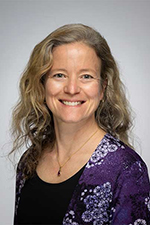Foundation Award for Teaching

Michelle Morgan
History
Reynolds College of Arts, Social Sciences and Humanities
I. Philosophy of Teaching
I strongly believe that a core purpose of teaching and learning history is informed citizenship in a democratic community, a process that requires the skills of civic discourse and the intellectual curiosity to investigate and incorporate multiple viewpoints. My approach to this process begins with building an inclusive and “safe-ish” learning space, one in which each student feels welcomed and intellectually challenged. Being challenged is not always comfortable, and I emphasize to my students that learning requires that we encounter and explore the unfamiliar. This process begins with getting to know my students and continues through cultivating active listening. Grounded in the scholarship of historical thinking and inclusive classroom practices, my teaching scaffolds the steps of the historical process in order to foster students’ ability to ask rigorous historical questions, analyze sources, and draw informed conclusions. These steps provide a foundation for my students to participate in broader conversations about our histories and engage in civic action to support our schools and communities. I believe these skills encourage my students’ growth as citizens and scholars, and that they play a crucial role in preparing our pre-service social studies teachers for the challenges of teaching authentic history in our current environment.
II. Examples of Courses/Topics
My teaching spans undergraduate and graduate courses, including course offerings on the histories of American education (HST 787), the American West (HST 537/637), and American Empire (HST 314 and HST 724). I also regularly teach our introduction to historiography (HST 390), our junior primary source seminar (HST 393) and our senior seminar (HST 598), which are all important elements of our department’s core curriculum. A central component of my teaching responsibilities centers on the BSED-History program, for which I have served as Program Coordinator for seven years. I also support the program through teaching advanced social studies methods, supervising field experiences, and facilitating the student teaching seminar (HST 422 and HST 423). I’ve conducted these courses in a variety of modalities, working with our undergraduate students in Springfield and around Missouri as well as reaching our MA students across the world.
III. Future Projects
My research and teaching continue to focus on the roles schools have played in the inculcation of “American” values in newly acquired territories, emphasizing the participation of teachers as cultural agents. I analyze the experiences of educators in the American Pacific West between 1890 and 1930, a period of consolidation and incorporation of these areas into the U.S. empire. Western spaces, progressive reform, and American hierarchies of race, gender, and class offered both possibilities and constraints to teachers. Teachers used themes of authority, modernity, and democracy to understand and define their roles, demonstrating how teachers understood the process of incorporating settler spaces into the United States. In doing so, my work continues to highlight the pivotal role teachers played (and continue to play) in shaping what it meant to be an American citizen in a democracy. In addition, I have begun work on a project that examines the role of public education in Hawai‘i’s campaign for statehood, paying particular attention to the intersection between democratic education and students’ political actions.
I have also begun collaborating with local districts, the Missouri Council for History Education, and MSU faculty to design professional development opportunities focused on civic engagement and the teaching of history. These efforts, which will serve both in-service and pre-service social studies teachers, are intended to foster community between our students and their future colleagues.
IV. Topics related to teaching and of interest to the University Community, for which you are available for presentations and/or consultations (e.g., presentation tools, special topics, technology, public affairs).
Inquiry-based teaching; civic education; history of American education; teachers and teaching in historical context; American expansion and the American West.